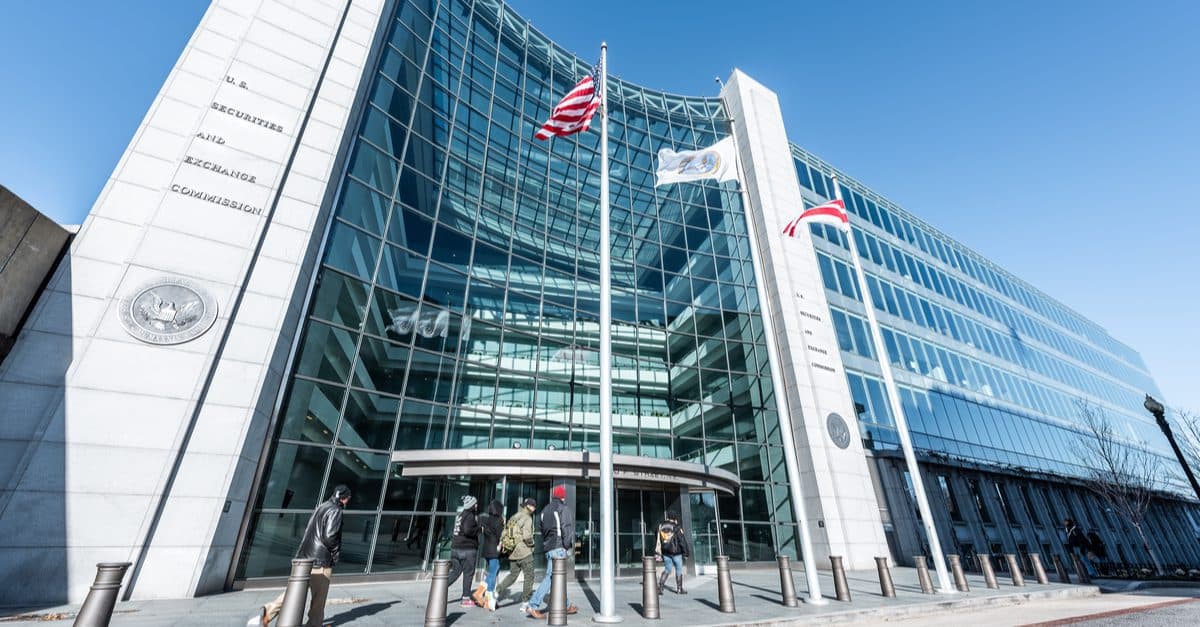SEC: Don’t Hold Your Breath for a Bitcoin ETF
Regulators will increase scrutiny of funds with exposure to bitcoin futures markets, the SEC’s division of investment management announced in a statement Tuesday.

US Securities and Exchange Commission; Source: Shutterstock
- The SEC revealed plans to evaluate the bitcoin futures market to determine whether it “appropriately” supports mutual fund investments
- Agency also warned that investors with exposure to mutual funds that have holdings in bitcoin futures should be aware of the risks
The US Securities and Exchange Commission latest statement warning investors about the risks of investing in digital assets was bad news for crypto fans — especially those anxiously awaiting approval of bitcoin ETFs some time in June.
Regulators will increase scrutiny of funds with exposure to bitcoin futures markets, the SEC’s division of investment management announced in a statement Tuesday. The agency also referred to bitcoin as a “highly speculative” asset.
“Wall Street and crypto giants have been looking for a way to integrate digital assets into funds or an ETF for several years,” said Haohan Xu, CEO of Apifiny. “Now, this reverse strategy of mutual funds actually purchasing Bitcoin futures has peaked the SEC interest.”
Bitcoin futures warnings
The statement, titled “Staff Statement on Funds Registered Under the Investment Company Act Investing in the Bitcoin Futures Market,” warned that investors with exposure to mutual funds that have holdings in bitcoin futures should be aware of the risks.
“Investors should understand that bitcoin, including gaining exposure through the bitcoin futures market, is a highly speculative investment,” the SEC said. “As such, investors should consider the volatility of bitcoin and the bitcoin futures market, as well as the lack of regulation and potential for fraud or manipulation in the underlying bitcoin market.”
The SEC revealed plans to evaluate the bitcoin futures market to determine whether it “appropriately” supports mutual fund investments. The organization will also “analyze the depth and liquidity of the bitcoin futures market.”
The SEC also said it will be looking into how bitcoin futures markets may accommodate a bitcoin exchange-traded product in the future, which is noteworthy given that none of the several bitcoin ETF applications currently sitting with the SEC are futures-based. The overall SEC sentiment toward a crypto ETF remained unchanged.
“If you read the statement from the SEC and the Division of Investment Management, you will hear the same rhetoric that meets every Bitcoin ETF application: ‘market abuse, market manipulation and liquidity,’” said Xu.
Poking holes
The Commodities Futures Trading Commision approved bitcoin futures trading in April 2020. The approval was largely seen as a precursor to the SEC eventually giving bitcoin ETFs the green light, but this new statement challenges that belief.
“Reading this statement, I think the SEC is directly addressing this argument that has been levied. We have one government agency, the CFTC, approving Bitcoin futures, while the SEC won’t approve a Bitcoin ETF,” said Nate Geraci, president of the ETF Store. “At the end of the day the SEC is simply pouring more cold water on a bitcoin ETF for the time being. They’re poking holes in a common argument that they’ve likely heard from prospective bitcoin ETF issuers.”
The SEC’s statement also raised concerns about the possibility of a bitcoin ETF becoming too large and dominant, potentially disrupting the underlying bitcoin spot market. Given crypto’s unique 24/7 global trading schedule, liquidity and pricing also continue to pose a challenge.
“Today’s crypto trading market is highly fragmented, meaning there are many disconnected liquidity pools and price discrepancies across different, disconnected exchanges,” said Xu. “The best way to ensure traders and investors have access to the deepest liquidity and best pricing is with robust technology that better connects the world’s crypto exchanges. This will also transform digital asset trading into a truly, unified global market.”
Delay tactics
Tuesday’s statement comes less than a month after Gary Gensler took over as SEC chairman. The cryptocurrency industry was largely supportive of Gensler’s appointment, given his apparent understanding of digital assets.
Gensler taught a blockchain course at the Massachusetts Institute of Technology and also served as a co-director of Fintech@CSAIL, a research group that investigates disruptive technologies. Gensler’s recent statements however feel like more of the same from the SEC.
“Between the Gamestop situation, Robinhood and Archegos, the SEC clearly has a ton on their plate right now, and I think it’s reasonable to consider whether a bitcoin ETF is on the back burner,” said Geraci. “Gensler has already said publicly that he has a pretty deep agenda and you have to wonder where a bitcoin ETF falls on that.”
The SEC’s continued delaying of a bitcoin ETF decision has many in the industry wondering what role an ETF may eventually play in the market. With retail and institutional investor interest in digital assets growing by the day, there is fear that by the time the SEC comes around, a bitcoin ETF may be obsolete.
“The crypto industry as a whole is moving at lightning quick speed, and so I expect additional development around infrastructure, which would connect the crypto ecosystem to the traditional financial services ecosystem,” said Geraci. “The more that happens, the less relevant a Bitcoin ETF becomes.”






